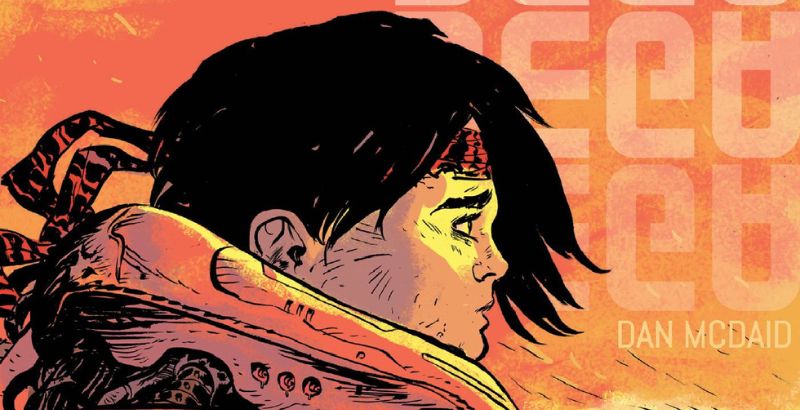
Dega is a sci-fi graphic novel published by Oni Press and written, illustrated, and lettered by Dan McDaid. This story is set on a planet after a single survivor crashes her ship. The survivor and her robot explore this world, where something lies within.
This a plot that merges both noise and quiet. The pace in the first half of the graphic novel has these fluctuating moments of intensity. The questions come quickly as flashes to different times and locations, adding so much mystery to the story. From the start of the comic, it is almost impossible to expect the scale it reaches by its conclusion.
There is an ominous adventure awaiting the protagonist, venturing deeper and deeper into a haunting planet. McDaid practically states within the dialogue that there is something deep within the world, which leads to an unceasing tension that sat in my gut the entire time I read. This is more than a horror story as the layers of the comic escalate. The extremely high concept element kicks in at the perfect time, but those periods of quiet reflection are beautiful. The finale is mindblowing, and although it is noisy, there is a peculiar serenity to it.
The conflict of emotions comes from the brilliant and thoughtful script. Dega is light on verbal dialogue, instead relying heavily on narration. This leads to that peaceful feeling for much of the graphic novel, magnified by the loneliness of the single character. The protagonist seems young, but the narration denotes wisdom beyond their years. The mannerisms are very matter-of-fact, explaining what is happening succinctly and clearly. But there is a repeated phrase that resonates with a theme of existentialism. This mantra becomes a necessary tether considering the zenith the comic reaches.
The art is superb. There is an incredible scale that McDaid utilises for almost the entirety of the story. The protagonist looks small, her presence overshadowed by the sheer magnitude of the planet she has landed on. But this scale requires extra attention to detail everywhere else on the page. It’s a hostile and rough location, especially when the hero travels underground.
The main character’s design is brilliant, with a high-tech, bulky suit protecting the fragility inside. But in a dream sequence, there is a creepy and unnerving change to the costume. The designs of the other beings met on the planet are also terrific, with fun and unique concepts for each creature. It has been a long time since a comic I read uses size difference in such an emotive and expressive way. McDaid has a way of using sheer enormity to instill helplessness. The illustrations in the final part of the graphic novel are just remarkable.
The colours are beautifully atmospheric. The variation between hot and cold draws the eye. In the sky, there is a dark, planetoid shape framed by a bright light that hangs in the air sinisterly. The way the orange light blends with the purples or the blues of the darkness is stunning and fascinating. I could spend hours studying and absorbing the sight.
Dega is a mesmerising sci-fi comic. McDaid’s script and his art are equally gorgeous as this long project explores more than just a planet. The depth in writing, implementing an extremely high concept while being contemplative about existence, expands the mind. The ending is just glorious and completely unexpected; the surprise and scale of the moment is breathtaking.
Dega is available where comics are sold.
Dega
TL;DR
Dega is a mesmerising sci-fi comic. McDaid’s script and his art are equally gorgeous as this long project explores more than just a planet. The depth in writing, implementing an extremely high concept while being contemplative about existence, expands the mind.




